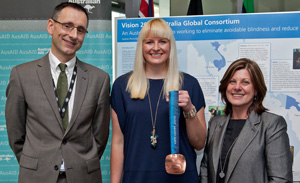Eye health is a passion of Jess Gallagher's–she suffers from a rare degenerative eye condition known as cone dystrophy, and was diagnosed as legally blind at the age of 17. Despite her deteriorating eye condition, Jess continued to pursue her lifelong dream of representing Australia at the Olympics.
An avid snowboarder, Jess turned her efforts to skiing in a bid to represent Australia at the Paralympics in 2010 in Vancouver. Demonstrating her dedication and positivity, Jess went from being a novice to an elite skier in a very short period of time–training while also studying her Masters degree in Osteopathy. Her dreams became reality when she took bronze in the alpine skiing slalom at the 2010 Winter Paralympics. Jess describes the day as 'the greatest day of her life'.
As Global Ambassador for Vision 2020 Australia [external website], Jess visited AusAID to talk to staff to mark World Sight Day on 11 October 2012.
Jess feels privileged to carry the title of Ambassador. She recognises that while she has access to eye and health care in Australia, many people in developing countries do not.
'Despite the fact I only have eight per cent vision and am legally blind I can still live my life the way I like,' Jess said.
CEO of Vision 2020 Jennifer Gersbeck said Jess is one of those people who can make us all feel like under-achievers.
Not content with representing Australia at the winter games, Jess made history again when she competed in the London Paralympic Games in the long jump and javelin.
'She is the first female to have competed in both a summer and winter Paralympics–an amazing achievement,' Ms Gersbeck said.
Ms Gallagher and Ms Gersbeck will travel to Vietnam next week to experience first-hand the benefits that Australian Government funding has had in the region. They plan to visit hospitals, schools and village projects to understand how people's lives have been transformed.
World Sight Day–11 October 2012
World Sight Day was launched by the World Health Organization (WHO) [external website] to recognise all partners involved in preventing visual impairment or restoring sight. It is the main event for the prevention of blindness and more specifically for 'Vision 2020: The Right to Sight', a global effort to prevent blindness created by WHO and the International Agency for the Prevention of Blindness.
Australia has been a leader in the field of avoidable blindness–committing more than $80 million to blindness prevention work since 2007.
In 2008, Australia launched the Avoidable Blindness Initiative (ABI), which has supported eye-health and blindness prevention programs, including partnerships with organisations such as the International Agency for the Prevention of Blindness (IAPB) and WHO in the Western Pacific Region.
Australia also works with eye-care organisations such as the Fred Hollows Foundation and eight other members of the Vision 2020 Australia Global Consortium in developing countries to build capacity and provide services to address blindness and visual impairment. Since 2008, the ABI's prevention programs have:
- provided more than 400,000 vision screenings
- completed more than 27,000 sight-restoring surgeries
- dispensed more than 15,000 spectacles
- trained more than 4,000 eye-health workers.

